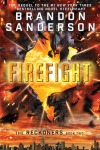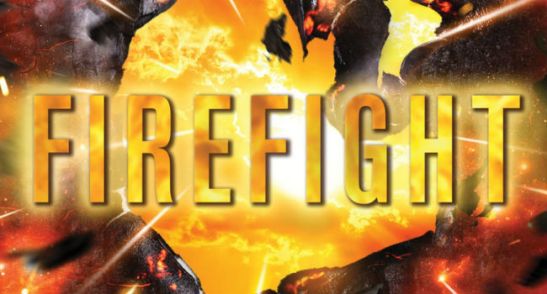Review: Firefight
Since reading The Rithmatist around two years ago, I’ve gotten hooked to Brandon Sanderson’s young adult novels. I spent years before that knowing who Sanderson was and the titles of the book he wrote – and I sold them in bookstore when I was working there – but I’d never read one… to my great and utter shame. Sanderson has a way with words that just flowed in the right way across the pages. There is never a dull moment in his stories – probably because it seemed to me that Sanderson always knew how to make small moments matter. This is never more true than in the second book in his Reckoners series, Firefight.
The Reckoners is a series that is set in a dystopian USA where some people have been gifted with superpowers at an event called Calamity. But using these gifts drive those people to become mad with power and instead of becoming heroes, they become villains. These gifted people, these so-called villains, are called Epics. Teenager David Charleston was introduced in the first book, Steelheart, as a normal person without gifts who collects data on Epics, with a goal to defeat the eponymous villain out of vengeance in the steel-constructed futuristic Chicago, now called Newcago. David joins the band of rebels called The Reckoners who secretly fight these Epics but on a much lower scale. He makes some new friends, including the leader of the Reckoners Jonathan ‘Prof’ Phaedrus and a mysterious young woman named Megan who immediately attracted him… in that way. Although, to call them friends, David would have to acknowledge that he had Epics as friends. But together David and the Reckoners defeated Steelheart and they are ready for their second adventure in another dystopian American city.
 In Firefight, David and Prof find themselves in Babilar, a.k.a. Babylon Restored, formerly known as New York. This version of NY submerged in water, thanks to an Epic named Regalia who can manipulate water and use it as her power, and this is a huge problem for a Newcago kid like David, who’s never had much to do with this substance – claiming even, in the story, to not have been used to of regular showers. This is just one of the new details we find out about David, a protagonist whose background story was covered extensively in the first book. It also made for a pretty exotic and creepy setting in this second book because, to be completely honest, water scares me more than steel does.
In Firefight, David and Prof find themselves in Babilar, a.k.a. Babylon Restored, formerly known as New York. This version of NY submerged in water, thanks to an Epic named Regalia who can manipulate water and use it as her power, and this is a huge problem for a Newcago kid like David, who’s never had much to do with this substance – claiming even, in the story, to not have been used to of regular showers. This is just one of the new details we find out about David, a protagonist whose background story was covered extensively in the first book. It also made for a pretty exotic and creepy setting in this second book because, to be completely honest, water scares me more than steel does.
Sanderson works this element to the maximum, going to the extremes by giving us a Reckoners base that is submerged in water, putting these Epic-fighters in what amounted to be an underwater aquarium. A device that allows our hero to fly over Babilar’s watery surface called ‘the spyril’ also add to the dark water horror of Firefight. My point is: if you’re scared of water, you might want to stay away from the book.
But the change of setting does work. It’s an opportunity for us to learn more of what the new USA looks like post-Calamity. (Unlike The Hunger Games‘ Panem, this version of dystopian America is more relatable to me, simply for the fact that Sanderson spells out what exactly happens to some of those cities after the Epics arrived.) Knowing that the third book will be set in Atlanta (or so Wikipedia tells me), I imagine that geography will play an important part in the series, as do elements like fire, water, earth and so on. There will be many other places to look forward to.
For now, though, we get to witness David’s struggle as he balances his need to eliminate bad Epics and save the good ones before someone else does. It’s an interesting struggle: on the one hand, David wants to believe that some of them can be saved, but on the other, we’re also not seeing much evidence of why they should be saved. So far in the story we know more malevolent Epics than benign ones. Prof and Megan notwithstanding, there are more out there like Steelheart, Regalia and the superbly terrifying Obliteration. For the readers, this means relying entirely on David’s perception of the Epics, and we can never know until he does whether an Epic is worth saving or not. I admit to struggling a little bit with the concept of ‘good’ Epics. By their own admission in this book, it’s extremely difficult for Epics not to use the powers that drive them evil, and most of them have so far failed in resisting it. But David is a compelling protagonist who’s impossible to deny. So if he says they can be saved, I tend to believe him… even when I’m not seeing much evidence of it.
That is, to me as a reader, one of the best parts about Firefight. Sure, David’s quest for the truth about Epics – and his resistance to accepting super powers that would make him evil – are also great elements to the story but my main point of attraction is that conundrum over the Epics’ nature of good and evil. The fate of Prof and Megan make this part important in the saga’s continuity, because we’ll get to see what drives David in the future of this world.
If there’s one thing I’m not enamored of with Firefight, it’s how the book ended. It’s a tad inconclusive for my liking and I’m dissatisfied with the closing chapter and the epilogue. Mind you, it doesn’t really end with a cliffhanger but I compared to how Steelheart ended, I felt cheated out of some answers in Firefight. For example, there are times when I feel that the new Reckoners introduced here – Val, Exel and Mizzy – are just fillers. David himself expresses curiosity for these Reckoners’ background but doesn’t get any answers. Neither do we. Sure, he explains that Reckoners don’t usually share details of their lives with each other to avoid spilling too much about their teammates in case they get captured, but still… I could’ve used a bit more background into them. Why are they there? Why are they the ones Prof sent to observe Babilar? There were similar questions floating about in Steelheart, but I wasn’t left with a sense of disorientation as I finished the book. And that’s a huge difference with how I felt when I closed the last page of this book.
Nonetheless, I’m looking forward to find out more in the next book, due to be released next year. Although, I have to say, I’m more looking forward to the sequel of The Rithmatist. I’m curious about the next part in the Reckoners saga, but I won’t mind if The Aztlanian comes out first.

